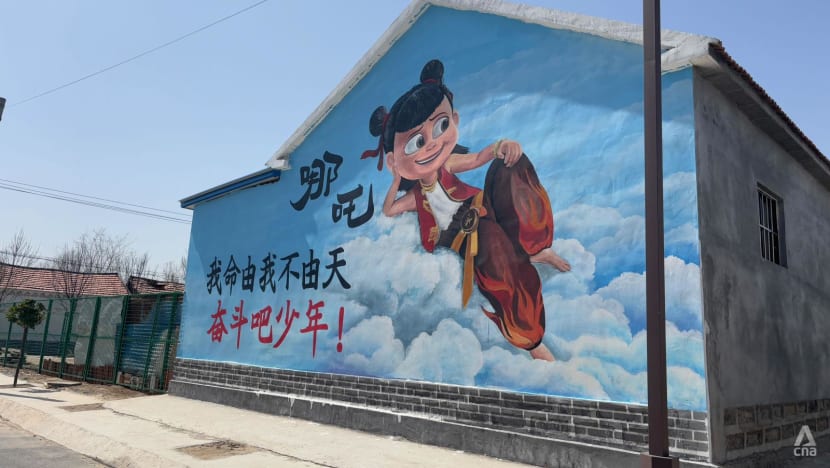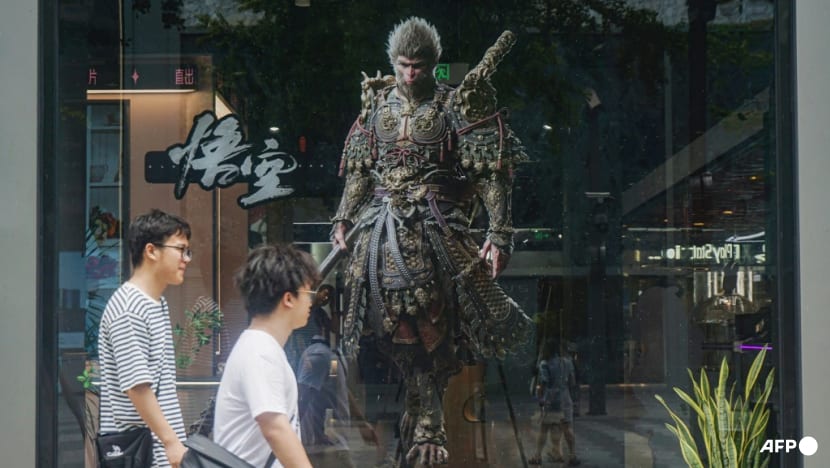China Power: C-drama fever sweeps Southeast Asia, with shows dominating screens and hearts
SINGAPORE: A young and resourceful Chinese empress embarks on an epic journey to seek justice and revenge against enemies who destroyed her kingdom.
It was this storyline from the hit 2016 Chinese drama The Princess Weiyoung that got Nadhiroh Napri hooked on C-dramas.
What began as casual viewing quickly turned into a deep passion for the 27-year-old Malaysian, who has since been learning Mandarin and plans to visit China.
"I loved it. I would miss assignments during my school days because I was so busy binge-watching," she told CNA.
Another fan, 27-year-old Singaporean Cheryl Goh, enjoys romantic C-dramas like 2023's Till the End of The Moon, which starred her favourite idol, Chinese actor Luo Yunxi.
"Chinese celebrities are a large driving force," Goh said. "(After) watching the shows, I begin to like them and want to follow them."
"C-dramas are sometimes easier to understand compared to Korean or Japanese shows ... there's no language barrier," added Goh, who is ethnic Chinese.
"They are quite interesting, (featuring elements of) traditional Chinese culture, wordplay and festivals."
From AI technology and social media apps like DeepSeek, TikTok and Xiaohongshu to record-breaking animation films and highly sought-after toys and collectibles, China has been increasingly leveraging new trends and technologies to augment its soft power.
The strategy has been important for Beijing in shaping regional perceptions and subtly building influence - particularly at a time when distrust has been slowly rising amid territorial disputes and geopolitical tensions, experts said.

THROUGH THE LENS OF CULTURAL EXPORTS
Blending Chinese history, culture, language and values, C-dramas have become a key cultural export.
These binge-friendly shows - typically revolving around themes like romance and Chinese history - are rapidly gaining popularity among new audiences in Southeast Asia.
Shows like 2024’s Legend of Shen Li, starring veteran actress Zhao Liying as a Chinese general who escapes an arranged marriage, have been doing a good job carving out a niche among regional audiences, said Gwendolyn Yap, also Tun Dato Sir Cheng-Lock Tan MA Scholar at the ISEAS Yusof-Ishak Institute in Singapore.
"Audiences are always looking for new things to consume," Yap said, adding that some might also be feeling "viewer fatigue" with endless K-dramas.
The C-drama formula of historical storylines and stunning visuals has "worked well" for Nadhiroh, who finds Chinese content "more familiar and accessible" compared to shows from South Korea.
"As a Southeast Asian, Chinese culture is not new to me," she said. "There’s great (historical storytelling) and characters that build up the plot."

The popularity of Hong Kong and Taiwanese drama shows in Southeast Asia during the early 2000s paved the way for C-drama success in the region, Yap said. "C-dramas are well-positioned for regional audiences."
"Popular Hong Kong and Taiwanese dramas have already seasoned audiences in the past, creating a sense of nostalgia and familiarity for the viewer so that may make C-dramas more easily adoptable for regional audiences."
Shows like the 2001 idol drama Meteor Garden proved popular in Southeast Asia in soft launching the careers of its four male actors who went on to form the popular Taiwanese boy band F4 and left a lasting cultural impact.
Tran Hoang Bao Chau, a 27-year-old from Ho Chi Minh City, grew up with Hong Kong dramas and Chinese martial arts movies.
"(The shows) shape my perceptions about China," she told CNA.
C-dramas like 2022’s Wild Bloom depict early struggles of Chinese entrepreneurs during the 1990s, according to Tran. "It shows how people from lower classes struggled a lot," she said.
The lives of characters can seem so "vivid and real", she added. "I sometimes even see myself in them."
Yap said that much of China’s cultural expansion is part of its push for cultural diplomacy and "telling China’s story well".
"The Chinese government has made it easier – through domestic policies - for local production companies to expand and develop the technology necessary to create good content."
At the same time, regional expansion - including creating streaming platforms and promoting dramas and animations - "is largely down to the entertainment companies themselves", said Yap, who added that the Chinese government had "bigger things to worry about".
"It would be worth pointing out that what made Chinese dramas more popular in the region is based on the decision of the production companies, and the state has remained largely hands-off," said Yap.
She cited hit C-drama The Untamed - starring popular actors Xiao Zhan and Wang Yibo - which paved the way for greater attention towards Chinese dramas in the region.
CULTURAL STORYTELLING FUELS SOFT POWER
Apart from C-dramas, other cultural influences include social media, cuisine, and popular games such as Genshin Impact, developed by Shanghai-based studio miHoYo.
China also saw success with the release of Black Myth: Wukong - a role-playing video game which took the gaming world by storm, selling more than 10 million copies globally within days and cementing China’s position in the global gaming leagues.
Experts have also noted that the effectiveness of soft power depends on multiple factors. "From a creator’s perspective, there isn’t a formula that can simply be imitated," said Sheng Zou, an assistant professor and interdisciplinary media scholar at Hong Kong Baptist University’s School of Communication.
"You must have a compelling story that resonates emotionally with people, offers an experience and aesthetics that are engaging and accessible - for cultural products, these elements are crucial."
He also spoke about the record-breaking global success of Chinese animation Ne Zha 2 which ignited a sense of national pride among Chinese cinema-goers.

The show’s selling power is in its characters who are beloved "Chinese cultural symbols".
"Audience preferences and responses are often highly unpredictable. Using these familiar cultural symbols can help mitigate some of that uncertainty," he said.
"They inherently possess strong communicative power … and are extremely familiar and popular among Chinese people both at home and abroad, even among non-Chinese audiences."
Still, even though these cultural influences have won fans across the region, they don't necessarily shift perceptions - especially when politics comes into play.
A recent annual ISEAS survey, which polled over 2,000 respondents across 11 Southeast Asian countries, found that most countries remained "divided in their trust toward China".
Distrust levels was especially high among respondents from countries like Myanmar, Indonesia, Vietnam and the Philippines, who believed China’s economic and military power continues to threaten national interests and sovereignty.
"These evolving perceptions reflect a mix of optimism about China’s economic prospects and pessimism surrounding geopolitical tensions, which are important factors that will continue to shape ASEAN’s long-term perceptions of the country," the ISEAS report said.
Speaking to CNA, Nadhiroh said Chinese entertainment "in general doesn’t change (her) perception or sentiments towards China".
"I probably love the aspect of culture integration in their daily life, but other than that, that's just it."
Nadhiroh also felt that in recent years, C-dramas have been showing "quite (a) concerning amount of propaganda or patriotism of China".

A WIN FOR CHINESE STREAMING GIANTS
C-dramas have translated into lucrative overseas viewership for Chinese streaming giants - a sign of Beijing’s successful strategy to aggressively promote its streaming services and platforms in the region.
"The Chinese government has actively pursued partnerships with Chinese-owned streaming platforms to facilitate the global distribution of Chinese dramas," said Thammasat University’s Dr Kornphanat Tungkeunkunt, writing in a commentary for Fulcrum.
Thailand in particular, has become a "prominent consumer market for Chinese streaming services in Southeast Asia", she noted.
Thailand: A regional entertainment hub
Of all the countries in Southeast Asia, Thailand stands out as a go-to destination for Chinese production companies.
Jeff Han, a spokesperson for Chinese tech giant Tencent, told CNA that Thailand was a natural hub for talent and entertainment production.
In 2024, Tencent filmed its popular reality idol competition series Chuang Asia in Thailand.
Filmed in Bangkok, the 10-episode series saw 70 trainees from countries around the region like Malaysia, Thailand and Vietnam, vying for spots in a new multinational girl group.
Thammasat University’s Dr Kornphanat Tungkeunkunt called it "a strategic move" that not only allowed Tencent to bypass strict domestic regulations in China, but also “opened new opportunities” in international markets.
Season 2 was also filmed in Bangkok, beginning last December, and featured appearances by several Thai celebrity mentors including singer Jeff Satur, rapper BamBam - more famously known as a member of the K-pop boy band GOT7 - and Blackpink’s Lisa.
The show, which aired from Feb 2 to Apr 6, saw 60 aspiring trainees from nine countries and regions competing to form the new seven-member boyband NexT1DE.
Thailand’s "dynamic entertainment industry", "well-established idol culture" and global appeal made it ideal to host and film the reality show, Han said.
"With many successful Thai stars gaining international fame, the country offers an ideal environment to discover and nurture new talent."
But even as Chinese pop culture offerings gain traction in the region, Chinese entertainment companies still face great hurdles navigating Southeast Asia’s diverse and "uneven technological terrain" to cater shows and other offerings for local audiences.
"Products will have to be accessible to all audiences," she said.

The rise of Chinese streaming services has driven the growing consumption of C-dramas across Southeast Asia, especially in countries like Thailand and Malaysia, a spokesperson from Chinese streaming giant iQiyi told CNA, citing statistics from consulting firm Media Partners Asia.
In 2023, C-dramas accounted for up to 20 per cent of streaming viewership in five Southeast Asian countries - Indonesia, Malaysia, Philippines, Singapore, and Thailand - according to the firm. Thai viewers alone made up 50 per cent of the total viewership.
iQiyi, which held a special screening of its sleeper hit Strange Tales of Tang Dynasty in Singapore last July, said online searches for C-dramas have risen annually over the past five years and "recently showed signs of surpassing Korean dramas".
Thailand remains its biggest market, with the highest number of monthly active users, the spokesperson said, followed by Vietnam and Indonesia.

C-DRAMA TOURISM BOOM
While Japan remains the region's favourite travel destination, a growing number of Southeast Asian travellers are naming China as their top holiday choice, according to the 2025 ISEAS survey.
6.7 per cent of respondents chose China as their favourite holiday destination, up from 5.9 per cent the year before.
And many Southeast Asian fans have been living out their dreams, travelling to destinations in China to immerse themselves in C-drama experiences.
Just like K-drama fans who visit South Korea to rent traditional hanbok and dress up like their favourite stars, C-drama enthusiasts are flocking to iconic locations such as the historic Hengdian World Studios in eastern Zhejiang province, donning ancient flowy hanfu to reenact scenes from their favourite shows.
Chongqing in southwestern China might be renowned for hot pot but for Thai C-drama fans, the city is a major draw because of Chinese actor and singer Xiao Zhan, known for his roles in popular fantasy and romance dramas, who was born there in 1991.
It was also the setting for popular Chinese romantic drama The First Frost. Fans have paid pilgrimage, visiting various locations featured in the show including the Yangtze River Cableway and the Liziba train station - famous for spotting metro trains driving through and disappearing into a block of flats.
One Thai TikTok creator in Chongqing named Pocky, filmed a video of herself in the city, recreating a promotional video that Xiao had once done for his home city. The video went viral, garnering more than 6,000 likes and left an impression on starstruck fans who said they wished to visit Chongqing for this reason.
"Younger audiences are making China the destination to visit, next to South Korea and Japan," Yap said, noting that many would go on to share their experiences on social media.


Another location popular among C-drama fans is the Xiatianxia Tourist Area in the southeastern Fujian province, where tourists and fans alike can dress up in hanfu and "live out their wuxia dreams" - "flying" in the air hoisted up by wires like characters in popular C-dramas and kungfu movies.
Desirae Tan from Singapore said that her love for C-dramas was "a catalyst" for her to visit China. "I want to live my C-drama dreams," the 29-year-old told CNA.
Traditional Chinese hanfu are a must for any C-drama fan visiting China, Tan said. "You want your own photoshoot. It’s affordable and you even have added bonuses like videos."
"If you want to live out your C-drama dreams, China is the place to go - you have the scenery and it’s cheap."
"They make it work - nowhere else caters to (this experience) authentically."
"However, while Chinese dramas may increase the interest in tourism to China, it may not necessarily influence viewers’ perceptions of China and their political values," said Yap from ISEAS.
In the end, while cultural exports like C-dramas may not reshape every perception, they serve as powerful tools of soft power - sparking curiosity and drawing regional audiences into stories that bring Chinese culture to life.
Disclaimer: Investing carries risk. This is not financial advice. The above content should not be regarded as an offer, recommendation, or solicitation on acquiring or disposing of any financial products, any associated discussions, comments, or posts by author or other users should not be considered as such either. It is solely for general information purpose only, which does not consider your own investment objectives, financial situations or needs. TTM assumes no responsibility or warranty for the accuracy and completeness of the information, investors should do their own research and may seek professional advice before investing.
Most Discussed
- 1
- 2
- 3
- 4
- 5
- 6
- 7
- 8
- 9
- 10